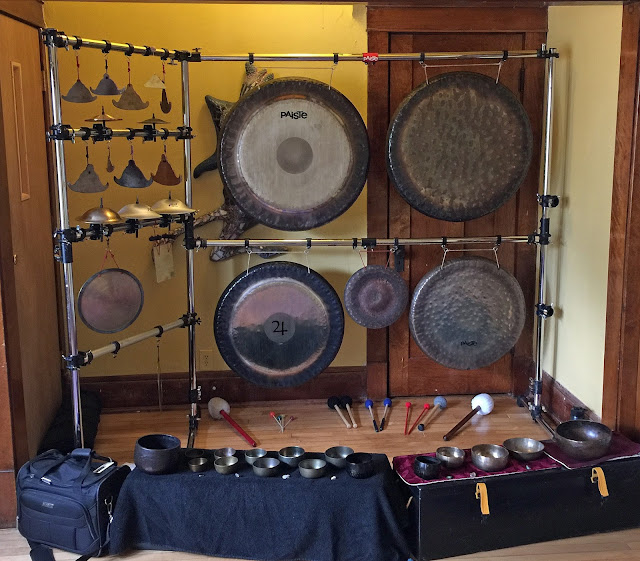Working With Instruments You Don't Like
I hand pick most of my instruments. I play through a lot of different ones to find the ones that will work for me. But sometimes I buy things online, based on sound files/videos, or just a general knowledge of what it will most likely sound like.
In both cases, sometimes when I get the instrument home, and start playing it, there is a sense of disappointment, or a feeling of “That doesn't sound like I thought it would.” This can often be attributed to the changing acoustics of different rooms, or even my own changing mood from day to day. But sometimes things just don't sound the way I had hoped they would. What's a person to do?
A first reaction might be to dump it, sell it online and hopefully recoup all, or most, of what I spent for it. But a better thing to do is to live with it, to work with it, to give it time to sink in.
We like familiar music, clothes, food, etc. Often, something different puts us off. The same can be said for our instruments. But I have found that over time, instruments that I was not initially excited over, often became important sounds for what I do.
A good example of this is a new instrument I recently bought online from someone I trust. The video sounded good, but when I played it in my studio, I was underwhelmed by it. After my initial dislike, I decided to give it some time and work with it. I changed the mounting and worked with various types of mallets. I also played it with all my other instruments to hear how it could fit in and be a new and different voice. Over the course of the past month, I have adjusted to its sound and found how it can fit in with my set up. Surprisingly, it has gotten a lot of positive comments from people at my sessions. They like how it sounds different from my other sounds and, some people have really identified with it. Just think if I had dumped it right away.
This same scenario has played out many times in the past 40 years. And in each instance, I have taken the time to get to know the instrument, letting it show me what it can do, and how I can play it to yield a wide variety of sounds. And sometimes I just put something away for a month or two, then pull it out again with fresh ears ready to give it a new listen. I can honestly say that there's only one thing that I ended up selling to someone else, and that's because it never fit into the sound of all my other instruments.
Nothing worthwhile ever comes easy. So before you give up on an instrument that you just bought, take the time to both work with, and get familiar with it. Time is on your side.
~ MB
In both cases, sometimes when I get the instrument home, and start playing it, there is a sense of disappointment, or a feeling of “That doesn't sound like I thought it would.” This can often be attributed to the changing acoustics of different rooms, or even my own changing mood from day to day. But sometimes things just don't sound the way I had hoped they would. What's a person to do?
A first reaction might be to dump it, sell it online and hopefully recoup all, or most, of what I spent for it. But a better thing to do is to live with it, to work with it, to give it time to sink in.
As humans, we are most attuned to familiarity.
We like familiar music, clothes, food, etc. Often, something different puts us off. The same can be said for our instruments. But I have found that over time, instruments that I was not initially excited over, often became important sounds for what I do.
A good example of this is a new instrument I recently bought online from someone I trust. The video sounded good, but when I played it in my studio, I was underwhelmed by it. After my initial dislike, I decided to give it some time and work with it. I changed the mounting and worked with various types of mallets. I also played it with all my other instruments to hear how it could fit in and be a new and different voice. Over the course of the past month, I have adjusted to its sound and found how it can fit in with my set up. Surprisingly, it has gotten a lot of positive comments from people at my sessions. They like how it sounds different from my other sounds and, some people have really identified with it. Just think if I had dumped it right away.
Sometimes our ears need time to adjust to unfamiliar sounds.
This same scenario has played out many times in the past 40 years. And in each instance, I have taken the time to get to know the instrument, letting it show me what it can do, and how I can play it to yield a wide variety of sounds. And sometimes I just put something away for a month or two, then pull it out again with fresh ears ready to give it a new listen. I can honestly say that there's only one thing that I ended up selling to someone else, and that's because it never fit into the sound of all my other instruments.
Nothing worthwhile ever comes easy. So before you give up on an instrument that you just bought, take the time to both work with, and get familiar with it. Time is on your side.
~ MB
Chop Wood / Carry Water / Play Gongs™



It`s good to get out of your comfort zone, playing with the unfamiliar or the unexpected extends your limits :)
ReplyDelete